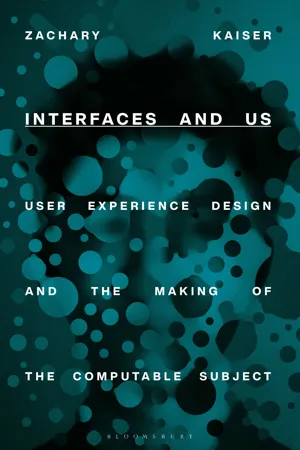
Interfaces and Us
User Experience Design and the Making of the Computable Subject
- 224 pages
- English
- ePUB (mobile friendly)
- Available on iOS & Android
About this book
We're all familiar with smart TVs making suggestions on our future watching, real-world exercise data being transferred into stats and infographics on our workout apps and turning up our home heating before we start our commute – but how does this world of technological interfaces affect our actions and perceptions of self?When society relies on computer models and their interfaces to explain and predict everything from love to geopolitical conflicts, our own behaviour and choices are artificially changed. Zachary Kaiser explores the harmful social consequences of this idea - balanced against speed and ease for the user - and how design practice and education can respond positively. - Concepts of freedom vs convenience
- Smart objects and manipulation
- Real world information transformed into data
- Technology's decisions made on our behalf
Frequently asked questions
- Essential is ideal for learners and professionals who enjoy exploring a wide range of subjects. Access the Essential Library with 800,000+ trusted titles and best-sellers across business, personal growth, and the humanities. Includes unlimited reading time and Standard Read Aloud voice.
- Complete: Perfect for advanced learners and researchers needing full, unrestricted access. Unlock 1.4M+ books across hundreds of subjects, including academic and specialized titles. The Complete Plan also includes advanced features like Premium Read Aloud and Research Assistant.
Please note we cannot support devices running on iOS 13 and Android 7 or earlier. Learn more about using the app.
Information
Table of contents
- Cover
- Halftitle Page
- Title Page
- Contents
- List of Figures
- Acknowledgments
- About the Author
- INTRODUCTION
- 1 HISTORICAL AND CONCEPTUAL ROOTS OF THE COMPUTABLE SUBJECTIVITY
- 2 DATA=WORLD
- 3 PREDICTION AND THE STABILIZATION OF IDENTITY
- 4 THE MORAL IMPERATIVE OF NORMALITY THROUGH COMPUTATIONAL OPTIMIZATION
- 5 THE QUESTIONS OF POLITICAL ECONOMY AND THE ROLE OF DESIGN EDUCATION
- CONCLUSION: TOWARD A LUDDITE DESIGN EDUCATION
- Bibliography
- Index
- Imprint